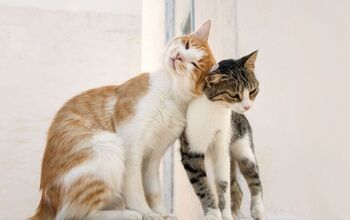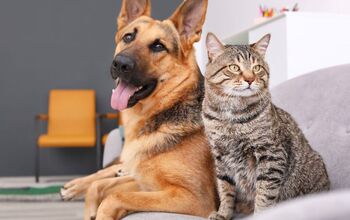Science Weighs In: Do Cats Or Dogs Make People Happiest?

Dog people of course remind you that a dog is a (wo)man’s best friend. Cat people will remind you that cats are royal animals, degreed by the gods themselves as bestowers of all things good. One researcher decided to really take a look and declare once and for all who made people happiest. (Spoiler: Dog people won’t be surprised.)
Related: 7 Joyful ways Dogs Make Us Happier
There’s lots of research that suggests the pet ownership has quite a few incredible perks, and improves our quality of life. Of course, what one sees as a perk, another may see as an obligation, so there’s not anything definitively specific when it comes to what it is exactly that pets do to make our lives better.
That said, we can look at how pets improve our mental health, and more specifically, whether one pet over another makes the biggest difference.
Dr. Brad Stennerson is a psychologist with the University of Oklahoma’s Counseling Center. He decided to tackle the question every dog person asks every cat person (and vice versa): Which pet makes us happiest?
Admittedly, Dr. Stennerson takes a lighthearted approach when broaching such a question, but the research does exist to shed light on the subject. He opted out of reviewing how snakes, lizards, turtles, frogs, spiders, fish, ferrets and more affected their owners’ mental health simply because there’s not enough real research to go one way or the other. Focusing on domestic cats or dogs, he reviewed research and compared them over three partially-arbitrary categories:
- The pet’s ability to provide comfort or boost their human’s mood.
- The level of attachment and social connection there is to the pet.
- The pet’s impact on their human’s activity level.
Dr. Stennerson considers these to be prevailing factors as they tend to be most directly tied to a human’s mental health and well-being. So, what did the research say?
With regard to a dog’s or cat’s ability to provide comfort or boost mood, the research is fairly mixed. Some studies show that pet ownership of either cat or dog led to lower stress, lower levels of depressive systems, less loneliness and better mental health. Other studies, however, showed no correlation between mood or depressive symptoms, stressl levels or lonely feelings and the ownership of a pet. Some research he uncovered found that cat owners were more depressed than dog owners, and some showed dog owners were more depressed than cat owners.
Dr. Stennerson factored in a common belief that most likely, each study the cat participated in solely depended upon whether or not the cat participated fully. Knowing dogs (cough, cough) do their best to please their humans, he had to look at more scientific factors. Some skewers of the research results may have been attributed to the fact that people with depression may disproportionally own (or not) pets, and that could affect results. Measuring tools may not have been measured differently for different people. Simple things like how a purr equivocates to a dog looking at you adoringly could also be immeasurable factors. For those reasons and more, Dr. Stennerson declared both dogs and cats to be fully beneficial in boosting the mood and comfort level of their pet, and equally.
When it came to how a dog’s level of attachment and social connection differed from a cat’s with relationship to their humans, it was a bit more clear. As humans, we are wired for connection, and generally speaking, Dr. Stennerson believes that healthy attachments make us happier. What’s important in this factor is how our pets help us connect to others.
Related: Cats Don’t Cause Mental Health Issues
In that, pet ownership often forces us to engage more with other humans. This connection, generally speaking, helps us make more meaningful connections, and these connections make us happier. When it comes to the levels between dogs and cats, it’s pretty clear that dog people tend to go out more and connect–at the dog park, at training classes, on neighborhood walks. This connection typically makes for healthier life dispositions.
As most of these connection opportunities are dog-centric (unless there are hidden cat parks felines and their humans are flocking to and we’re not aware of), Dr. Stennerson said that dogs typically lead us to engage more, and in this category, dogs are better for our mental health.
In the last category, which looked at the impact level, the evidence was most overwhelming. Increased activity is important for physical health, but also for mental health. Being more active is a therapy strategy for depression that is referred to as Behavioral Activation. When we do more physically, we feel better. This is especially true when we’re depressed.
People tend to do more physical activity with their dogs than they do with their cats. It’s just fact. Sure, there are a handful of cat enthusiasts who have somehow evaded their cat’s attempted murder every time they took them for a ‘walk,’ but for the most part, the science is irrefutable. Dogs encourage us to get out, get busy and get physical and that helps our physical and mental health. Dr. Stennerson again gave that category to dogs.
Granted, Dr. Stennerson took full credit for being blatantly biased in his settling the issue once and for all, and he encourages everyone to adopt one (or three) dogs right away.
But we’re nothing if not fair here at PetGuide and so we’ll ask you to weigh in to the pseudo-evidence-based research we’re sharing. Who makes YOU happiest? Your dog or your cat?

More by Lori Ennis























